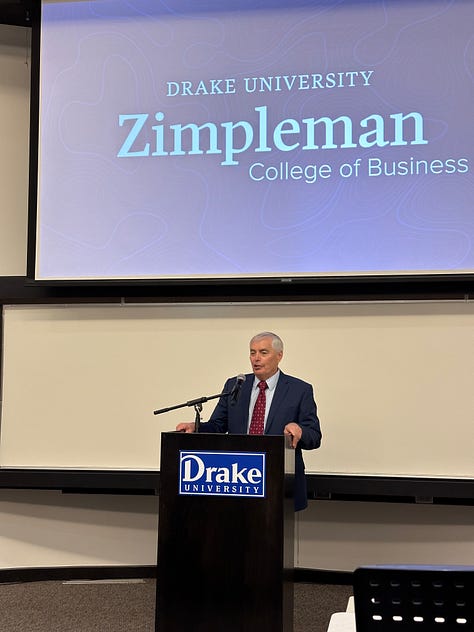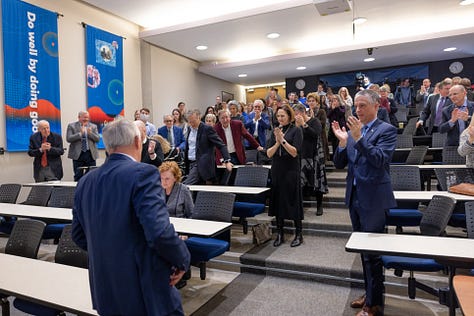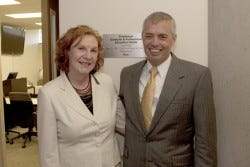As this column’s Monday Zoom lunch session has become a popular feature, it reminds me of my stint in the mid-1980s when I was a talk show host on the venerable 50,000-watt station, WHO. Our accumulated audience dominated the airwaves throughout the state. It was a heady time, and although I was never quite as outrageous as my predecessor, Susan Bray, it was a relatively pleasant era before ‘angertainment’ brought in listeners and, therefore, advertisers.
Today in Iowa, AM radio is dominated by far-right talk mixed in with some local interviews.
Nielsen ratings of local TV and radio are no longer covered in mainstream news services - even though a ‘bad book’ for any station earned a Page One news story back in my day. I would love to know how viewership and listenership have changed. How many still listen to AM radio? Has XM radio or podcasts taken over?
After about six weeks on the radio job, I got into the groove and started having fun with the callers. The numbers picked up. To this day, I still meet people in far corners of the state who remember the show.
And it is in that spirit that I will host an open show on our upcoming Monday Zoom lunch session. I don’t know if this will work, but let’s find out together. Join the experiment. If it works, we’ll do it again. If it doesn’t, what the heck? A ship is not built to stay at the dock. Trying something new is my thing.
Here’s our Monday Zoom schedule:
February 27: Open Format! Who knows what we’ll talk about? It’s up to you.
March 6: Futurist David Houle. This keynote speaker has delivered over 1,200 speeches on this topic. He is a sought-after speaker and business consultant. Houle doesn’t have a crystal ball, but does have an uncanny ability to see into the future. In my career as a business coach, David spoke to our group on three occasions. Some members credited what they learned as having altered their businesses, giving them an edge in anticipating changes in their industry.
March 13: Larry and Kathi Zimpleman, along with the dean of the Drake University Zimpleman College of Business, Alejandro Hernandez, will be our guests.
There was a major unveiling of the Zimplemans historic gift to their alma mater held on February 7. Although they were reluctant about accepting their name on the college, Drake President Marty Martin prevailed, and an unveiling ceremony was held to announce the special occasion earlier this month.
Dean Hernandez has the opportunity to help guide the context for the Zimplemans’ vision so that their support will enable students to learn how businesses can impact society. Here is an article written by Hernandez that will outline his thinking regarding implementing Zimplemans’ gift: Three Ways to Drive Societal Impact.
The Zimpleman’s were Drake students. Larry joked just before the speeches started for the announcement ceremony, that the kids and faculty he knew back in the 60s could never have dreamed the day would come when their names would become associated with the college in this way.



Full disclosure: I have become Larry and Kathi's real fan and friend. Their commitment to the community is substantial and even extends to the Iowa Writers’ Collaborative. They epitomize the phrase I first heard by Coon Rapids Banker John Chrystal: Do well while doing good. And that’s what Larry did as CEO of the Principal Financial Group. And that’s the mission in the future for the Zimpleman College of Business.
They are the real deal, and this commitment is to Drake and the ideal that businesses can make a difference by creating attainable, sustainable, and rewarding jobs.
This gives me hope: Zimpleman College of Business.
March 27, Boaz Rauchwerger. This guy will blow you away. He’s an internationally known speaker, and in just a few minutes will teach you ways to overcome shyness, sell just about anything, and make friends everywhere you go.
You do not have to be a paid subscriber to this column to attend these sessions. If you appreciate what we are doing, you can become a paid subscriber, which supports scholarships for the Okoboji Writers’ Retreat. Enroll in the retreat, and I’ll give you a comp subscription for a year. Enroll: www.okobojiwritersretreat.com
I hope you receive the Iowa Writers’ Collaborative column's weekly roundup. It’s so fun to have a collection of links from the past week show up in my email inbox.
Here’s our illustrious group in alphabetical order:
Iowa Writers’ Collaborative Columnists
Laura Belin: Iowa Politics with Laura Belin, Windsor Heights
Doug Burns: The Iowa Mercury, Carroll
Dave Busiek: Dave Busiek on Media, Des Moines
Art Cullen: Art Cullen’s Notebook, Storm Lake
Suzanna de Baca Dispatches from the Heartland, Huxley
Debra Engle: A Whole New World, Madison County
Julie Gammack: Julie Gammack’s Iowa Potluck, Des Moines and Okoboji
Joe Geha: Fern and Joe, Ames
Jody Gifford: Benign Inspiration, West Des Moines
Nik Heftman, The Seven Times, Los Angeles and Iowa
Beth Hoffman: In the Dirt, Lovilla
Dana James: New Black Iowa, Des Moines
Pat Kinney: View from Cedar Valley, Waterloo
Fern Kupfer: Fern and Joe, Ames
Robert Leonard: Deep Midwest: Politics and Culture, Bussey
Tar Macias: Hola Iowa, Iowa
Kurt Meyer, Showing Up, St. Ansgar
Kyle Munson, Kyle Munson’s Main Street, Des Moines
Jane Nguyen, The Asian Iowan, West Des Moines
John Naughton: My Life, in Color, Des Moines
Chuck Offenburger: Iowa Boy Chuck Offenburger, Jefferson and Des Moines
Barry Piatt: Piatt on Politics: Behind the Curtains, Washington, D.C.
Macey Spensley, The Midwest Creative, Davenport and Des Moines
Mary Swander: Mary Swander’s Buggy Land, Kalona
Mary Swander: Mary Swander’s Emerging Voices, Kalona
Cheryl Tevis: Unfinished Business, Boone County
Ed Tibbetts: Along the Mississippi, Davenport
Teresa Zilk: Talking Good, Des Moines
If you aren’t already receiving the weekly roundup, sign up here:
We are proud to have an alliance with Iowa Capital Dispatch.





After listening to the recent podcast and especially the business of the farm bill etc. I have several comments, 1) Why is it we can spend so much money developing markets for mono crops and factory farming meat production, but nothing for anything else? 2) Why is it conservation plans that are required for some of the farm programs don't include things like cover crops, but always include tiling that make the water problems worse? 3) I heard nothing about dual crops that work as cover crops, things such as winter wheat that can be harvested by simply setting the headers high and simply taking the wheat heads and leaving the rest while the second crop develops 4) if 52 % of the corn crop is used for alcohol production how much fresh water can we afford to waste on creating alcohol while the manure we are creating with factory farms pollutes what water supplies we have assuming you have enough water to water humans and livestock. Let us not forget that water vapor is also a greenhouse gas. Nor should we forget that the amount of manure created by the number of hogs and cattle we have in feed lots and hog factories is equivalent to the entire population of the US in terms of manure and all of it untreated. We already have several diseases in these hog operations that we no longer can control for, 80% of the antibiotics needed to control disease in these operations are lost in manure and near 100 % of the diseases come from the ground. Eventually that will spell disaster for hogs and potentially people.
I came in late, but what I heard didn't improve my expectations. His take on Capitalism and Democracy are complete opposites, the only reason they have worked at all here is because there was enough land and resources to exploit and when that ended capitalism started exploiting anything they could get their hands on; largely labor and government. The business of Aristocracy over Democracy with Ukraine being central to his predictions, seems to miss the point Ukraine is not a democracy and were it not a proxy of the west that recieved tons of support from us, the war would have been over. The oligarches from Ukraine took no chances, they jumped on their yachts and left for the west. Those who do the business of terror are often not connected to anything logically predictable. Nothing about the war in Ukraine is even slightly connected to radical groups and terrorists. Steve Hanken